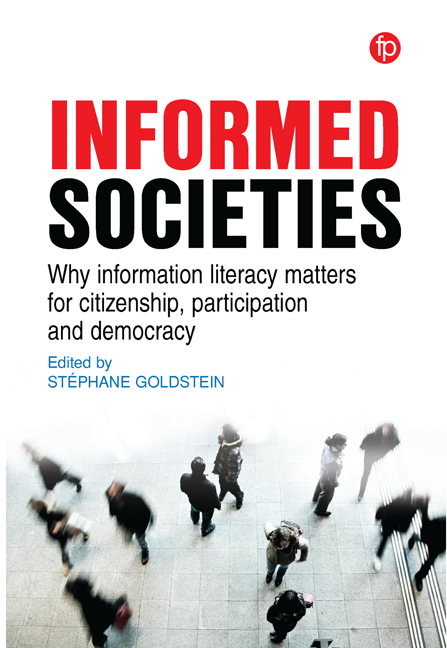Book contents
- Frontmatter
- Contents
- Figures and Tables
- Notes on the authors
- Foreword
- Introduction
- 1 Information Literacy in the Digital Age: Why Critical Digital Literacy Matters for Democracy
- 2 The Discourses of Power, Information and Literacy
- 3 What Intellectual Empathy Can Offer Information Literacy Education
- 4 The ‘Post-Truth’ World, Misinformation, and Information Literacy: a Perspective From Cognitive Science
- 5 Media and Information Literacy: Intersection and Evolution, a Brief History
- 6 Information Literacy and National Policy Making
- 7 Information Literacy as a Growth Pillar for a Fledgling Democracy
- 8 Information literacy and the Societal Imperative of Information Discernment
- 9 Libraries and Democracy: Complementarity in a Regime of Truth
- 10 Scottish Public Libraries Welcome Syrian New Scots: a Transition from Being a Refugee to Becoming an Active Part of the Community
- 11 Information Literacy, Lifelong Learning and the Needs of an Ageing Population
- Index
7 - Information Literacy as a Growth Pillar for a Fledgling Democracy
Published online by Cambridge University Press: 22 February 2020
- Frontmatter
- Contents
- Figures and Tables
- Notes on the authors
- Foreword
- Introduction
- 1 Information Literacy in the Digital Age: Why Critical Digital Literacy Matters for Democracy
- 2 The Discourses of Power, Information and Literacy
- 3 What Intellectual Empathy Can Offer Information Literacy Education
- 4 The ‘Post-Truth’ World, Misinformation, and Information Literacy: a Perspective From Cognitive Science
- 5 Media and Information Literacy: Intersection and Evolution, a Brief History
- 6 Information Literacy and National Policy Making
- 7 Information Literacy as a Growth Pillar for a Fledgling Democracy
- 8 Information literacy and the Societal Imperative of Information Discernment
- 9 Libraries and Democracy: Complementarity in a Regime of Truth
- 10 Scottish Public Libraries Welcome Syrian New Scots: a Transition from Being a Refugee to Becoming an Active Part of the Community
- 11 Information Literacy, Lifelong Learning and the Needs of an Ageing Population
- Index
Summary
Introduction
Almost a quarter of a century has gone by since political democracy¹ and the World Bank reported that South Africa is the most unequal society in the world, and that its poverty is the ‘enduring legacy of apartheid’. The World Bank also reported that inequality has deepened since the dawn of this political democracy. This is contrary to the assertions made by successive national governments, which state that South Africa's transition from apartheid to democracy is a success. Keeton (2014) acknowledges that there have been significant attempts, through policy and legislation, to bring about economic and social democracy. He goes on to assert that poverty, lack of job creation, lack of public service delivery and so on are the root causes of inequality and not due to policy or political failure.
There is substantial commitment by the national government of South Africa to extend the political liberation to include socio-economic liberation; to bring into the democracy stable social inclusion. Buoyed by a progressive Constitution, complementary legislation and policy have been brought forward in support of a better future for the people of the country: a future in which no person lives in poverty, where no one goes hungry and where there is work for all. The elimination of poverty and reduction of inequality will accelerate the growth of the economy which will be of benefit to all South Africans. The National Development Plan (NDP) was constructed to serve as an action plan for securing the future of South Africans as advocated in the Constitution.
The NDP has, inter alia, the broad objectives of eliminating poverty and reducing inequality. Critical to achieving this and other objectives is the development of a citizenry that is skilled and has access to an infrastructure that will contribute to its growth and development. It is acknowledged that one of the most significant challenges that need to be overcome is that of illiteracy, which is viewed as a major cause of the poverty and failure of the nation. In order to overcome these challenges it is important that the country increases the literate base of the country to facilitate growth and development of the nation.
- Type
- Chapter
- Information
- Informed SocietiesWhy information literacy matters for citizenship, participation and democracy, pp. 129 - 148Publisher: FacetPrint publication year: 2019



